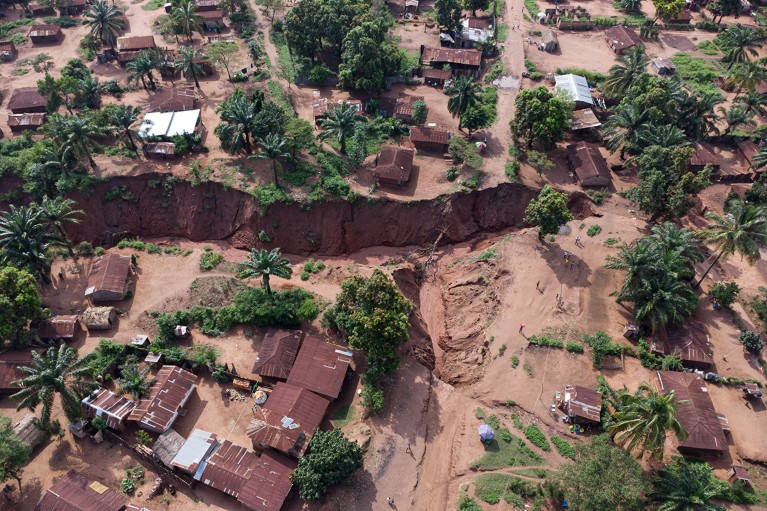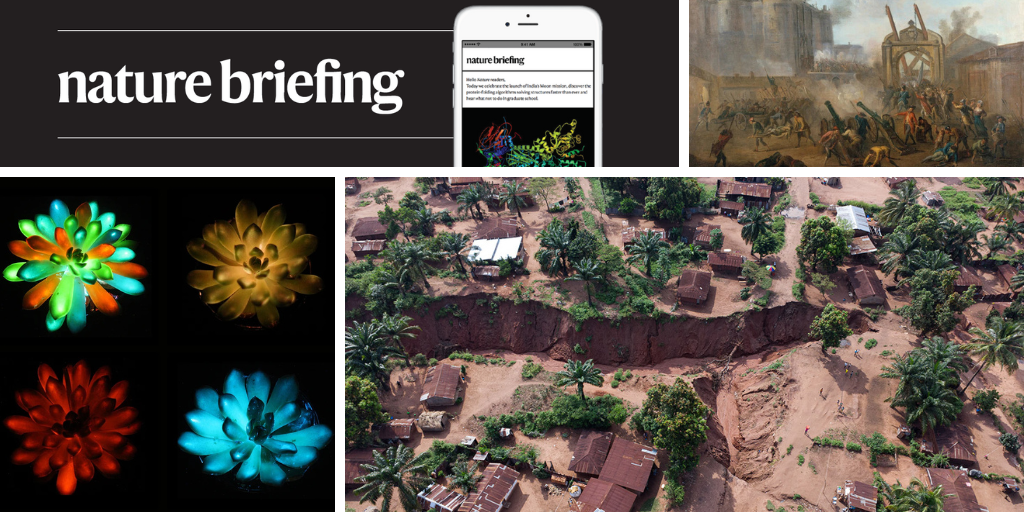You have full access to this article via your institution.
Hello Nature readers, would you like to get this Briefing in your inbox free every day? Sign up here.

Researchers gave these succulents in the Echevaria genus a glow up by injecting them with luminescent particles.Credit: Liu et al./Matter
Scientists have created glow-in-the-dark succulents by injecting the fleshy houseplants with luminescent material. The plants can glow in a range of colours — and even several colours at once — thanks to materials called phosphor particles, which absorb energy from light at one wavelength and slowly re-emit it at a different wavelength for several hours. This gives the shining succulents an edge over luminescent plants that get their glow from genetic tweaks, which are limited in the range of colours they can emit.
The administration of US president Donald Trump says the director it chose for the US Centers for Disease Control and Prevention (CDC), microbiologist Susan Monarez, is out of a job after only one month. She disputes the claim, saying she has neither been fired nor resigned. Monarez’s attorney said the health leader has been targeted because she “refused to rubberstamp unscientific, reckless directives and fire dedicated health experts”. At least three other senior leaders at the CDC have resigned. “My grandfather, who I am named after, stood up to fascist forces in Greece and lost his life doing so,” wrote physician Demetre Daskalakis, director of the National Center for Immunization and Respiratory Diseases. “I am resigning to make him and his legacy proud.”
Targeted rumours that spread like a virus across France in 1789 were at the heart of the ‘Great Fear’ — a period of panic and upheaval among peasants that laid some of the groundwork for the French Revolution. Using documents from the time period, researchers used modern epidemiological models to trace how false stories about roving gangs of bandits spread from one location to another. The team found that fearmongering deliberately targeted areas where peasant uprisings would be more consequential and that those with higher levels of literacy were more likely to be ‘infected’, which suggests that the false information had rational, not emotional, roots.
Two key structural changes to the ilium — a bone in the pelvis — during embryonic development allow humans to walk upright on two legs and accommodate giving birth to a big-brained baby. The first change rotates the ilium cartilage 90 degrees compared to that of other primates, which makes the pelvis short and broad. The second change is a delayed ‘ossification’ — replacement of the cartilage with bone cells — compared to other primates, which allows the cartilage to hold the shape of the pelvis as it grows.
Gullies — huge trenches that open in the ground without warning — are likely to displace hundreds of thousands of people across Africa within the next ten years. The trenches, which can swallow homes and businesses in an instant, displaced around 119,000 people in the Democratic Republic of Congo alone between 2004 and 2023. Preventing gully formation is more effective and affordable than stabilizing them after they form, note researchers, but interventions such as proper drainage systems are often prohibitively expensive.

A view of a deep urban gully in Kamonia in the Democratic Republic of the Congo. More than 3,000 people are at risk of this gully expanding.Credit: Ruben Nyanguila/Anadolu via Getty
Features & opinion
An alternative approach to treating acne might offer hope against a common condition that can sometimes cause severe physical or emotional symptoms. Two vaccine candidates aim to provoke the immune system into targeting the bacteria that grow in clogged pores. The vaccines would not be part of any general immunization programme, but would offer an option for people who currently rely on expensive, and not very effective, topical treatments.
This editorially independent article is part of Nature Outlook: Skin, a supplement produced with the financial support from LEO Pharma A/S.
Private companies are increasingly gathering innovative and useful data on Earth’s environmental changes — but they can’t replace what NASA’s satellites do, argues space-enabled-research scholar Danielle Wood. “Nor should they,” she writes. Publicly funded missions offer trusted data, reliable benchmarks and coverage that isn’t based on who can afford to pay. That’s why US President Donald Trump’s proposed cuts to such missions in the 2026 budget is a mistake, she argues.
Today I’m remembering not to make assumptions. For example, I could look at a giraffe and assume that its species is Giraffa camelopardalis. But as of last week, that could be wrong: the International Union for Conservation of Nature now recognizes giraffes as four distinct species, adding three to the previous tally.
The change isn’t just to trip up assumers like myself — splitting the group up can help researchers consider how to tailor conservation efforts to meet the needs of each species separately.
If we’ve made any incorrect assumptions about the content you’d like to see in this newsletter, please let us know — along with any other feedback — at [email protected].
Thanks for reading,
Jacob Smith, associate editor, Nature Briefing
With contributions by Flora Graham
• Nature Briefing: Careers — insights, advice and award-winning journalism to help you optimize your working life
• Nature Briefing: Microbiology — the most abundant living entities on our planet — microorganisms — and the role they play in health, the environment and food systems
• Nature Briefing: Anthropocene — climate change, biodiversity, sustainability and geoengineering
• Nature Briefing: AI & Robotics — 100% written by humans, of course
• Nature Briefing: Cancer — a weekly newsletter written with cancer researchers in mind
• Nature Briefing: Translational Research — covers biotechnology, drug discovery and pharma


